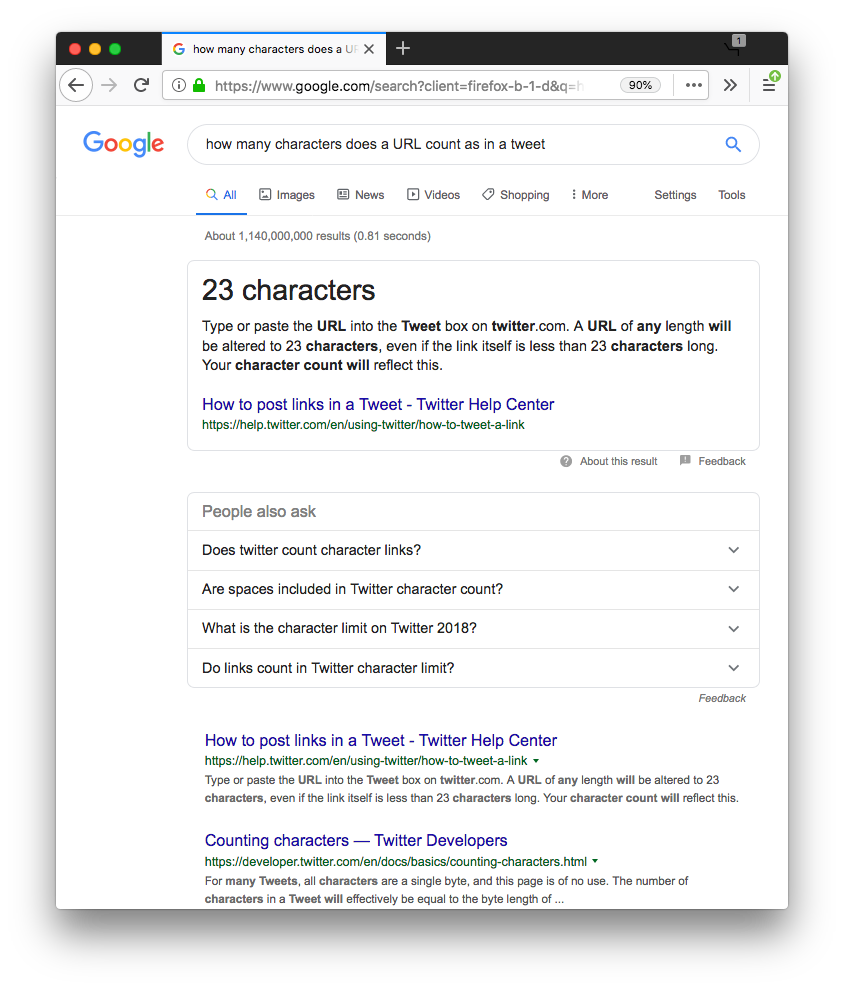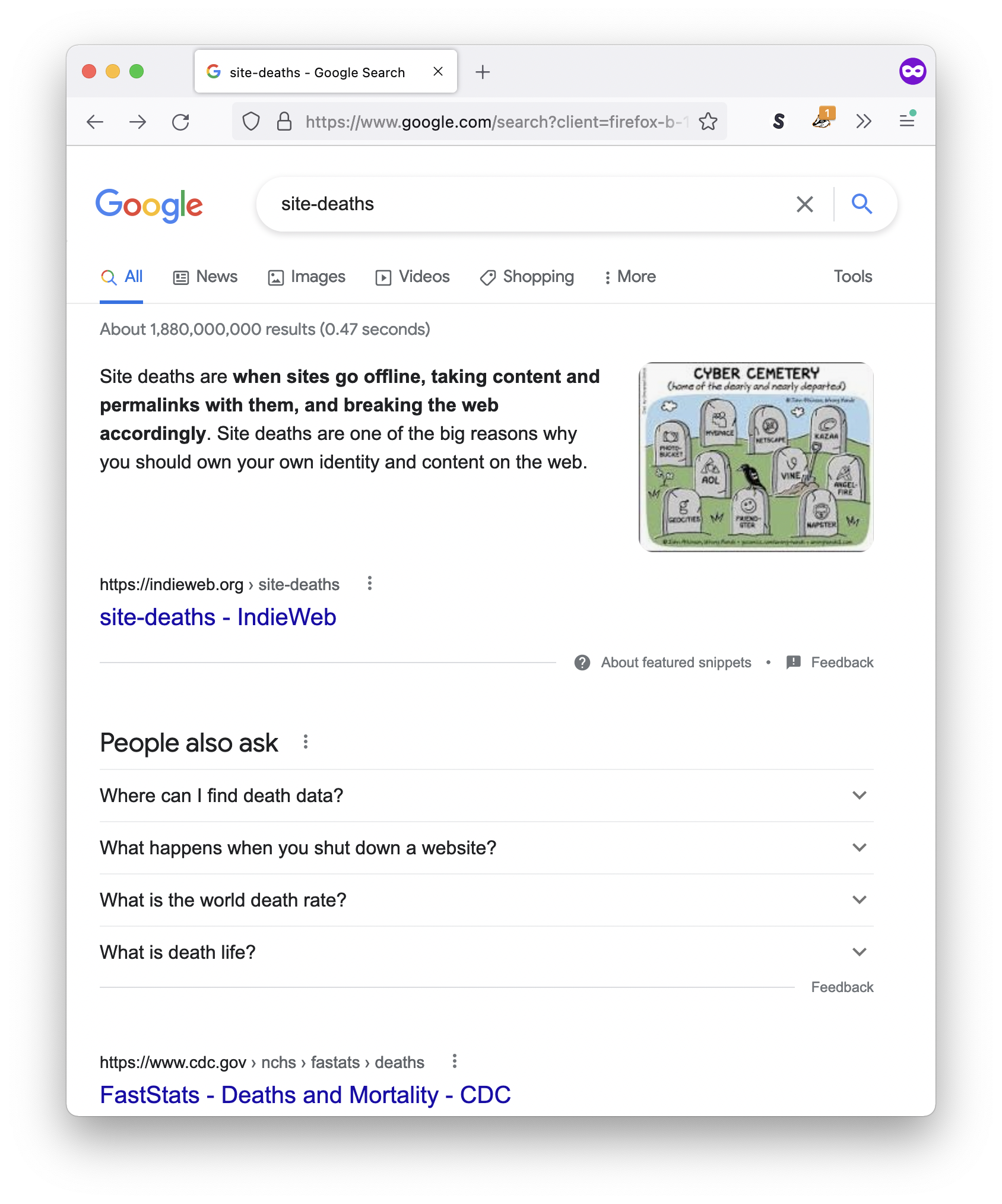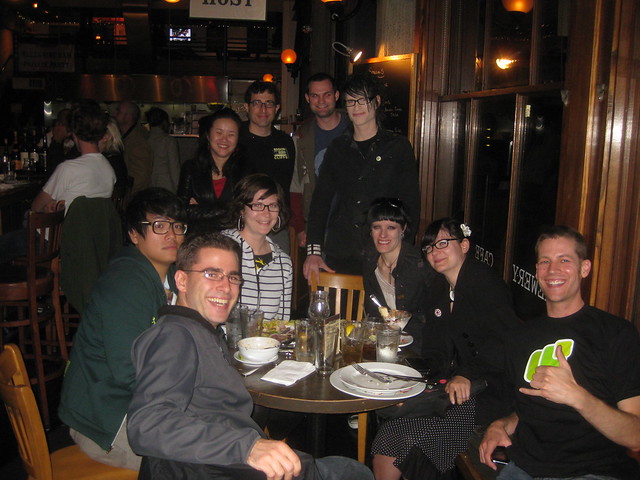Google Search
This article is a stub. You can help the IndieWeb wiki by expanding it.
Google Search is how Google started, a web search engine, and supports indexing and highlighting results with microformats, like IndieWeb event posts.
Google is primarily known for its dominant search engine.
Features
Featured Snippets
This section is a stub. You can help the IndieWeb wiki by expanding it.
See: https://developers.google.com/search/docs/appearance/featured-snippets
Google Supports Microformats
Google search will highlight results with microformats like those in IndieWeb posts.
2019 Microformats OneBox
Publishing a page with microformats can cause it to show up in Google Search’s OneBox feature, e.g. here is an event that came from an IndieWeb event post on tantek.com (with only h-event and classic hCalendar, no RDFa/microdata/JSONLD) when searching for just "indieweb events"
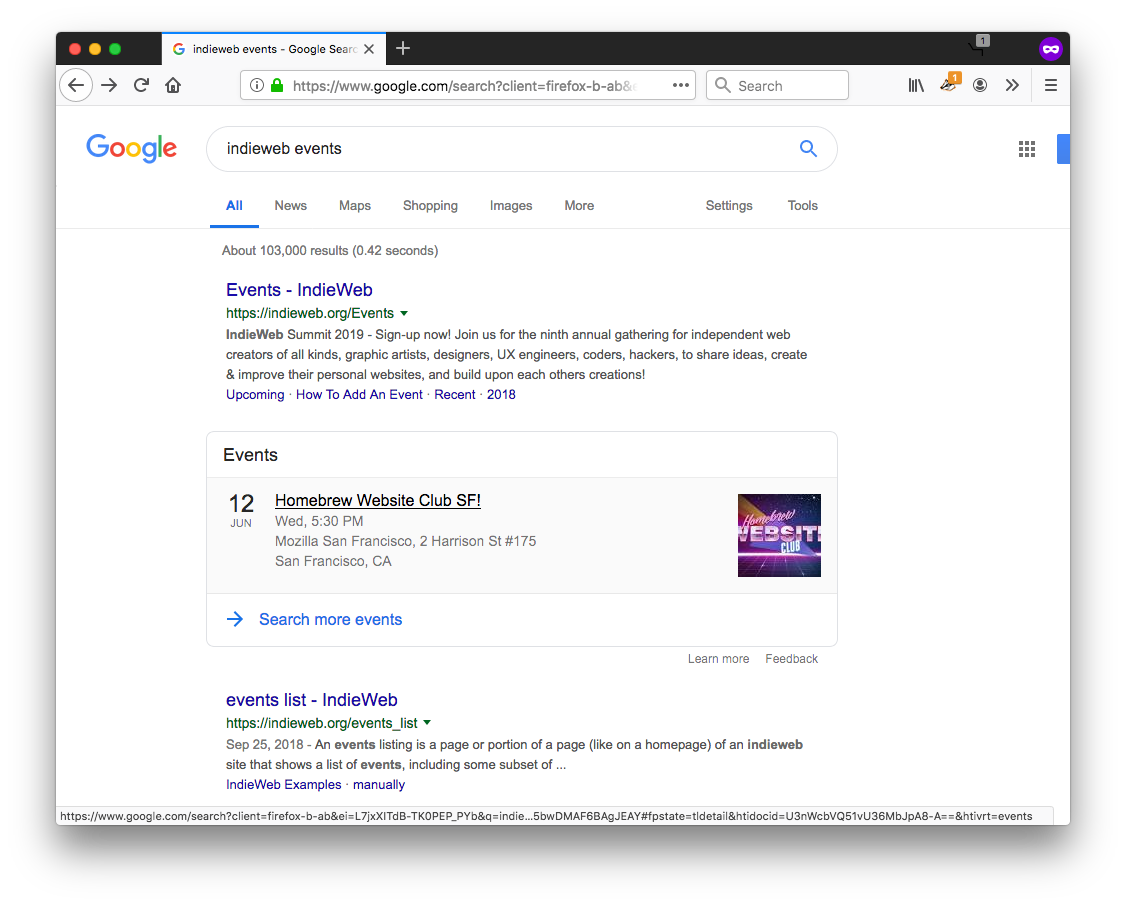 Note the following information from microformats:
Note the following information from microformats:
- event name, start time & date, location venue with address
2019 Event Search results
Clicking the "➡️ Search more events" link in the above OneBox navigates to Google Event Search which shows more detailed results for the Indieweb event:
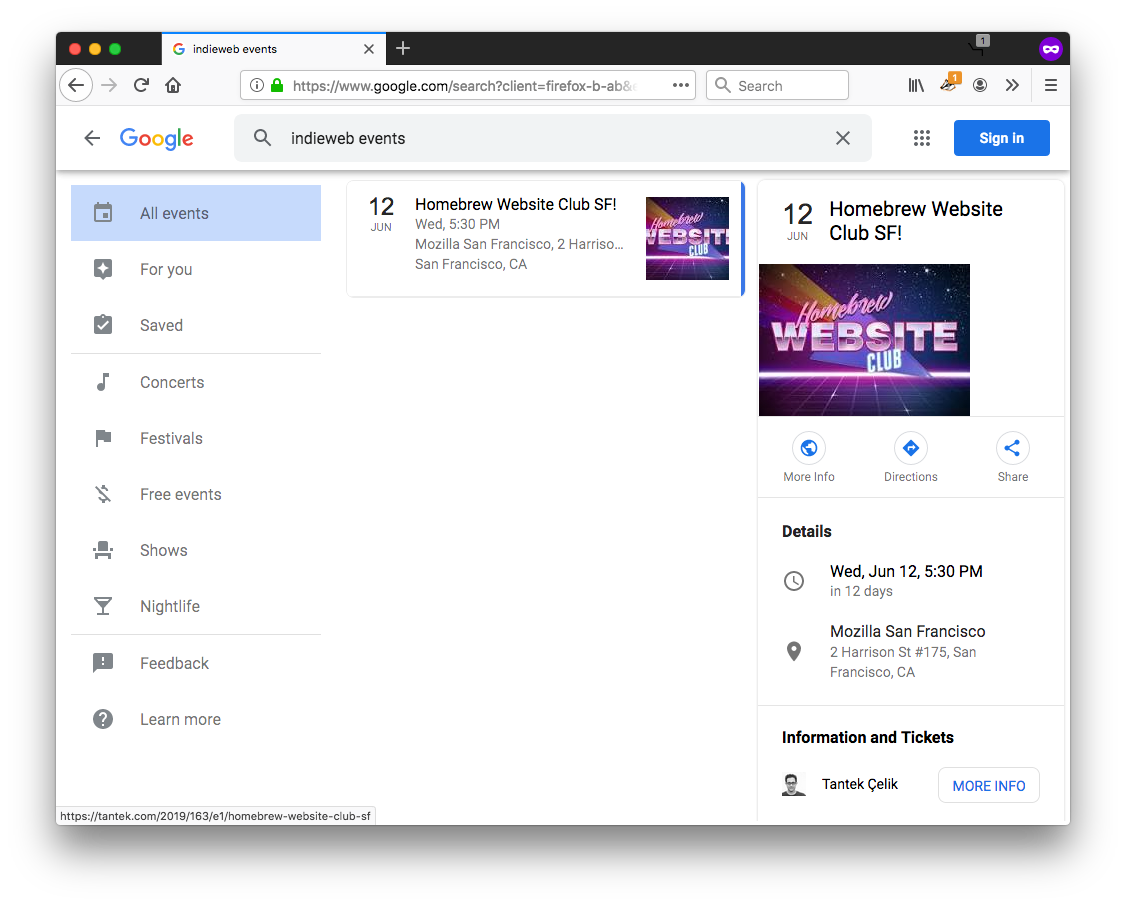 Note the cursor was hovering over the "🌎 More Info" link in the right column which the status bar in the lower left indicates links to the original event post on tantek.com, as does the entire "
Note the cursor was hovering over the "🌎 More Info" link in the right column which the status bar in the lower left indicates links to the original event post on tantek.com, as does the entire " Tantek Çelik MORE INFO" in the lower right corner. In particular note the following information from microformats:
Tantek Çelik MORE INFO" in the lower right corner. In particular note the following information from microformats:
- event name, start time & date, location venue with address, author, original permalink
- author icon, full name
Google Web History
You can save your Google search history by explicitly turning on Google Web History
And then look up your past Google searches:
- https://history.google.com/history/lookup (requires login)
Search History
Google collects your search history for the purpose of gathering data for ad serving.
They do this whether or not you are logged in (e.g. with cookies), and whether or not your have opted into Google Web History (see below), though you can also opt-out of all ad-customization.
There is something apparently that shows your demographic and psychographic buckets according to this data, but only at a high level. It should be browsable and searchable.
Apparently they scrub logs after somewhere between 6 and 18 months, and much of the extra details stored in history they don't store at all, or only temporarily (until the log savers get to it, i.e. days).
Featured Snippet
Aside from microformats support (see above), sometimes Google Search returns a result with what they call a "Featured Snippet" for a longer query, not necessarily tied to any explicit markup, just using their own algorithms.
E.g. a query for "how many characters does a URL count as in a tweet"
results in a large Featured Snippet of "23 characters" with longer explanation in a box:
Some IndieWeb pages show up in featured snippets as well, e.g. a (2022-04-04) query for "site-deaths" shows the full <dfn> sentence and featured image at the top.
IndieWeb History
Aaron and Tantek met via Google Search
On 2009-09-23, IndieWebCamp co-founders Aaron Parecki and Tantek Çelik met at an event Tantek organized, that Aaron found, via Googling for that date[1] and meetup san francisco[2] on the day of.
Aaron Parecki was visiting San Francisco (from Portland), used Google on 2009-09-23 to search for meetups in San Francisco, and found:
Aaron showed up, met a bunch of the microformats community in San Francisco:
Including Tantek. They kept up remotely and met again at the Federated Social Web Summit 2010, which provided inspiration for them to co-found the IndieWebCamp community, and co-organize (with Amber Case and Crystal Beasley) the first IndieWebCamp two-day event in 2011.
See Also
- search
- https://news.ycombinator.com/item?id=20326445
- "Google has been very clear lately (via John Mueller) regarding getting pages indexed or removed from the index.
If you want to make sure a URL is not in their index then you have to 'allow' them to crawl the page in robots.txt and use a noindex meta tag on the page to stop indexing. Simply disallowing the page from being crawled in robots.txt will not keep it out of the index.
In fact, I've seen plenty of pages still rank well despite the page being disallowed in robots.txt. A great example of this is the keyword "backpack" in Google. You'll see the site doesn't want it indexed (it's disallowed in robots.txt) but the site still ranks well for a popular keyword)." @bhartzer July 1, 2019
- "Google has been very clear lately (via John Mueller) regarding getting pages indexed or removed from the index.
- Criticism: Allows a brand’s competitors to buy ads on that brandname which then show up above the actual brand’s website, thus forcing brands to buy ads for their own brandnames as a preventative measure: https://twitter.com/jasonfried/status/1168986962704982016
- "When Google puts 4 paid ads ahead of the first organic result for your own brand name, you’re forced to pay up if you want to be found. It’s a shakedown. It’s ransom. But at least we can have fun with it. Search for Basecamp and you may see this attached ad." @jasonfried September 3, 2019
- ^^^
![screen shot of an ad on Google search results: Basecamp.com | We don’t want to run this ad. [Ad] www.basecamp.com We’re the #1 result, but this site lets companies advertise against us using our brand. So here we are. A small, independent co. forced to pay ransom to a giant tech company.](https://pbs.twimg.com/media/EDkTcjZXoAADGTM.png)
- ^^^ Example showing UI similarity between an ad and an actual search result: https://twitter.com/paulredmond/status/1168997365522534408
- "The subtlety of the UI that differentiates an "ad" from a normal result makes it feel like you're ranked 5th for "basecamp"." @paulredmond September 3, 2019
- Google Search Settings <- use this to toggle "SafeSearch", set # of results per page, include "Private results" in search results (or not), and change your default "Region" (e.g. from autodeteced "Current Region" to a specific country)
- Google Search Activity settings <- use this to set how often your search activity is deleted (manually, after 18 months, after 3 months).
- Criticism of Google Search (presumably) results, that the IndieWeb could do better: https://twitter.com/wblut/status/1307355448178356230
- "I'm painfully experiencing (again) how it is becoming increasingly harder to find up-to-date information. Most search results are either auto generated spam pages, aggregator junk, or stack overflow answers* from 2016.
* "This is not a valid question and you are dumb."" @wblut September 19, 2020
- "I'm painfully experiencing (again) how it is becoming increasingly harder to find up-to-date information. Most search results are either auto generated spam pages, aggregator junk, or stack overflow answers* from 2016.
- Criticism: provides “answers”, not results. Thread: https://twitter.com/killedbygoogle/status/1493887812583763969
- "Google Search changed from providing users results to providing users answers. Full stop. It’s not worse or dying, they just stopped caring about bitchy power users like me and OP.
“If you find Google Search frustrating, you are no longer their target user.”" @killedbygoogle February 16, 2022
- "Google Search changed from providing users results to providing users answers. Full stop. It’s not worse or dying, they just stopped caring about bitchy power users like me and OP.
- Criticism: 2022-02-17 Google Search Is Dying
h/t jackyThe bizarre relationship between Google and marketers often means the first page is full of display ads and results that are effectively ads.
- Criticism: 2022-03-10 The New Yorker: What Google Search Isn’t Showing You / The search engine has made up so much of our online experience for so long that it can be hard to imagine something better.
…prompted Dmitri Brereton, a twenty-six-year-old engineer at a recruiting-software company in San Francisco, to publish a blog post titled “Google Search Is Dying.”
- Criticism: Results overwhelmed by generic lists and spam: https://twitter.com/AnneNotation/status/1528524053522227200
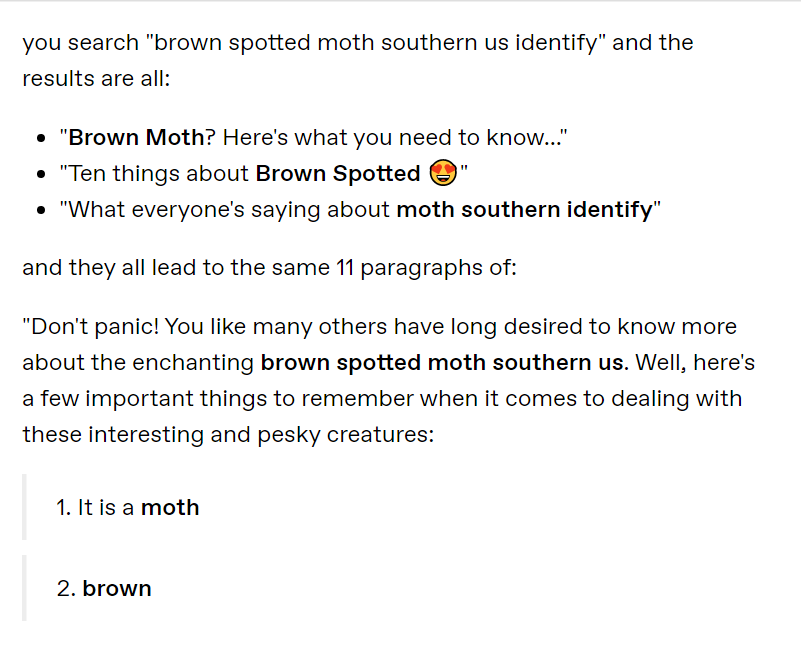
- "I've never seen a post that better summarized what happened to Google" @AnneNotation May 22, 2022
- Issue: 2023-02-03 Until further notice, think twice before using Google to download software / Over the past month, Google has been outgunned by malvertisers with new tricks.
- Criticism: Google Search AI Summaries harmful to the independent web (reduces click through to actual results) 2025-07-22 Pew Research: Google users are less likely to click on links when an AI summary appears in the results

